The rise of no code technology has democratized software development, putting the power of creation into the hands of the masses.
It's a journey that began with simple tools like Microsoft Excel in the 1980s, allowing us to crunch numbers without writing formulas. Fast forward to the early 2000s, and platforms like WordPress and Shopify began gaining popularity, letting anyone with a vision carve out their corner of the internet with little to no coding skills required.
Today, we're seeing the next evolution of this shift with no code platforms like Glide enabling people to create complex, functional applications without writing a single line of code. And the movement is gaining momentum. According to Gartner, 70% of new business applications will be built using no code or low code technologies by 2025.
Now, we are witnessing the next phase of this transformation: the convergence of no code and artificial intelligence (AI).
AI been reshaping the way businesses operate across diverse industries. From early innovations like the ELIZA chatbot and NASA's Spirit and Opportunity rovers to today's virtual assistants like Siri and Alexa and generative AI models like ChatGPT and Midjourney, AI has evolved into sophisticated systems capable of processing vast amounts of data, recognizing patterns, and automating complex tasks that once required manual coding.
By combining the accessibility of no code with the power of AI-driven functionalities, these platforms are drastically reducing development time, minimizing errors, and unlocking new possibilities for personalized user experiences. Whether you’re creating custom business software for yourself or for clients, combining AI and no code empowers you to efficiently create software that is not only functional but also intelligent and responsive to user needs.
In this article, we'll explore the no code AI app builders and how they're empowering businesses to create intelligent, adaptable software. We'll start by discussing the key considerations when choosing an AI app builder that aligns with your business needs and goals. Next, we'll provide an overview of the top AI app builders in the market as of 2024, highlighting their unique features and capabilities. Finally, we'll dive into how you can use these powerful tools to build AI-powered apps that automate your core workflows and drive innovation within your own (or your client's) organizations of any size—small business or enterprise.
How to choose the best AI app builder for your business
Finding the right AI app builder for your business is not just about picking the most popular platform or the one with the flashiest features. You need a solution that aligns with your specific needs, technical capabilities, and growth plans. Here's what to keep in mind as you navigate your options:
User interface and ease of use
First, you want a platform that doesn't require a computer science degree to use. Look for a clean, intuitive interface with drag-and-drop functionality and visual programming tools. The AI should enhance your workflow, offering helpful suggestions without overwhelming you. Remember, the goal is to simplify app development, not add another layer of complexity to your work.
Integration capabilities
Since many businesses already have established infrastructure, your app needs to play nice with other tools in your tech stack. Check out the native integrations offered by the platform. Does it support your existing mission-critical software? Make sure it also provides options for custom integrations via APIs so you don’t get stuck with a beautiful new app that can’t communicate with your existing or future tech stack.
Data flexibility
AI, at its core, processes information. That means your AI app builder needs to be able to access your business data in whatever format it exists in. Look for a platform with many data source options. You also need scalable native data sources if you want to handle large volumes of data at speed. For queryable databases, you may also need a platform with SQL capabilities. The more data you can connect to your AI app builder, the more tasks your AI will be able to perform for you.
Scalability and performance
Your app might start small, but what happens when your usage or user base grows significantly? Look for platforms that can handle this growth and scalability. Cloud-based app builders are often great options, offering the flexibility to scale up (or down) as needed. The key is finding a solution that can grow with your business, saving you from costly overhauls down the line.
Customization
While the appeal of AI app builders lies in their simplicity, they shouldn't limit your creativity. The best platforms strike a balance between ease of use and flexibility. Can you modify layouts to match your workflow? Adjust features to fit your unique processes? Implement custom logic for special use cases? Your chosen platform should help drive your vision rather than boxing it in.
Pricing structure
Look beyond the sticker price and consider the total cost of ownership. A cheaper option today might end up costing more if you outgrow it quickly. On the flip side, don't overpay for features you'll never use. Many providers offer multiple plans to choose from, catering to different business sizes and needs. Find a flexible pricing structure that aligns with your budget now and offers room to grow.
Support and documentation
Even the most intuitive platforms take time to master. That's why robust support and resources can make or break your app development experience. Look for platforms with a comprehensive LMS like Glide University, as well as tutorials, documentation, and product content libraries to help you with any learning curves. An active community or forum can be a goldmine of tips, tricks, and solutions to common problems. Good support can save you countless hours of frustration and help you get the most out of your chosen platform.
The other aspect of support is developer support. Not every business wants to build their own AI tools. Look for a platform with a thriving no code developer community. You want the option to hire an expert developer or get a solution created for you so you can get a customized app fast without adding too much to your team’s plate.
The top AI app builders in 2024
Before diving into specific AI app builders, it’s important to understand the two main approaches to integrating AI into the development process: developer-focused and user-focused AI.
Designed to streamline the overall building process, developer-focused AI suggests features, optimizes layouts, and generates code snippets. To make apps more intuitive and personalized for the end users, user-focused AI weaves intelligent capabilities like natural language processing, image recognition, and predictive analytics directly into the software.
The best AI app builders often combine both approaches, providing tools that simplify app development while also enabling the creation of AI-powered functionalities for users. When choosing a platform, it’s also essential to consider which approach aligns best with your project goals and team capabilities.
Now, let’s explore some of the top AI app builders on the market.
Glide
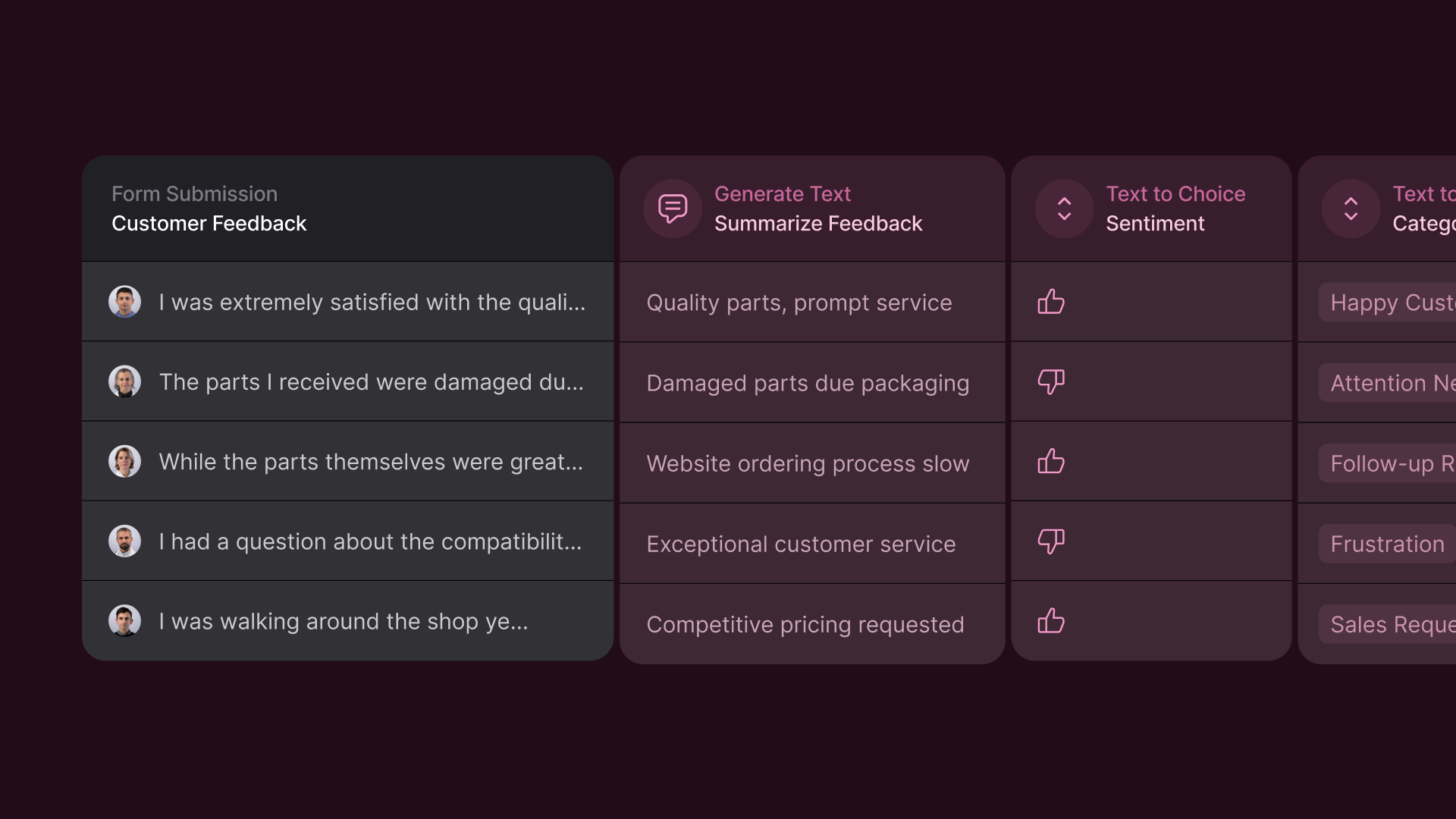
Glide is a platform for creating professional business software that connects your data and tools, all without the need for coding. It supports a wide range of data sources, including Airtable, Google Sheets, and MySQL. Its automatically adaptive design system ensures that the apps you build not only look professional but also function naturally across all devices.
There are three ways to build powerful AI apps with Glide. First, Glide’s AI app builder enables you to describe the application you want in plain text, generating a basic functional interface from your prompt. This gives you a huge headstart on designing your app. You can also integrate with external AI platforms like OpenAI, allowing you to use powerful large language models and their advanced functionalities.
Additionally, whereas other no code app builders mainly help you use AI to build your apps, with Glide AI, you add powerful AI functions directly to your app for your end users. This essentially gives you the power to build your own AI tools for your team, giving them the efficiency and productivity benefits of AI right within your custom business tools.
You can create natural language summaries of products, automatically extract information from images like receipts, transcribe audio recordings to send notes to customers, or generate summaries of business data that help you make better decisions faster. Businesses have used these features to build AI-powered logistics apps, help desks, and customer portals.
Glide calls this a “managed AI system.” This means that Glide selects the ideal AI model for your use case and handles all the back-end integration for you. Models are upgraded and changed as better versions are developed, so your app automatically gets more powerful over time. Your prompts and responses are cached, so your responses run faster, and you use fewer updates. You also benefit from enterprise-level prioritization through Glide, no matter how high your usage, making your AI features fast and performant.
Softr
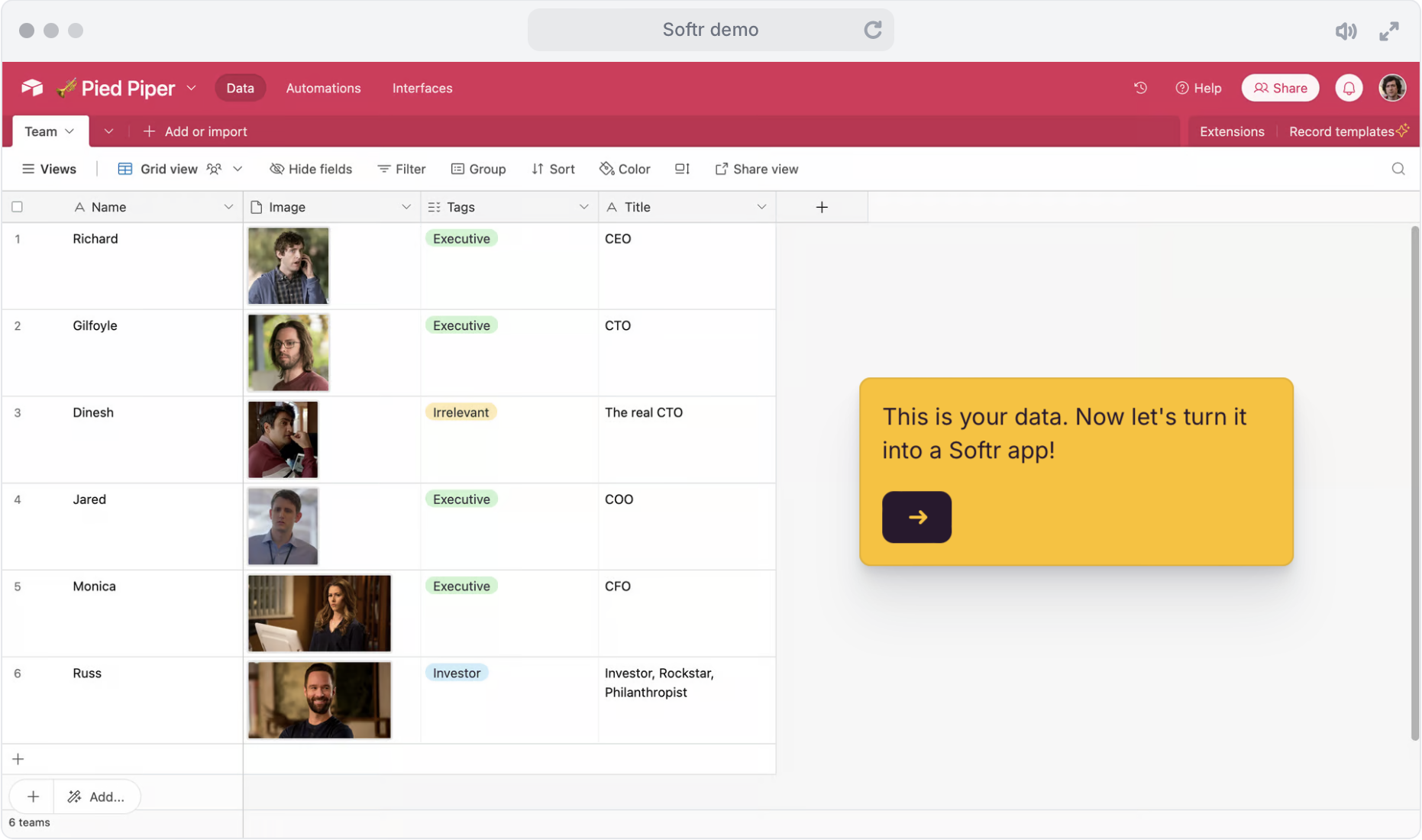
With its fairly easy learning curve and simple build style, Softr is a good fit for fully non-technical teams. It’s great for spinning up quick solutions, but it may not have the complexity to create more powerful applications.
With Softr’s AI app generator, users can generate apps from user prompts, turning databases into CRMs, client portals, applicant trackers, and more. With a developer-focused approach, Softr offers developers access controls, integrations, pre-built blocks like lists, charts, and forms, and the ability to quickly turn a web app into a mobile app.
Adalo
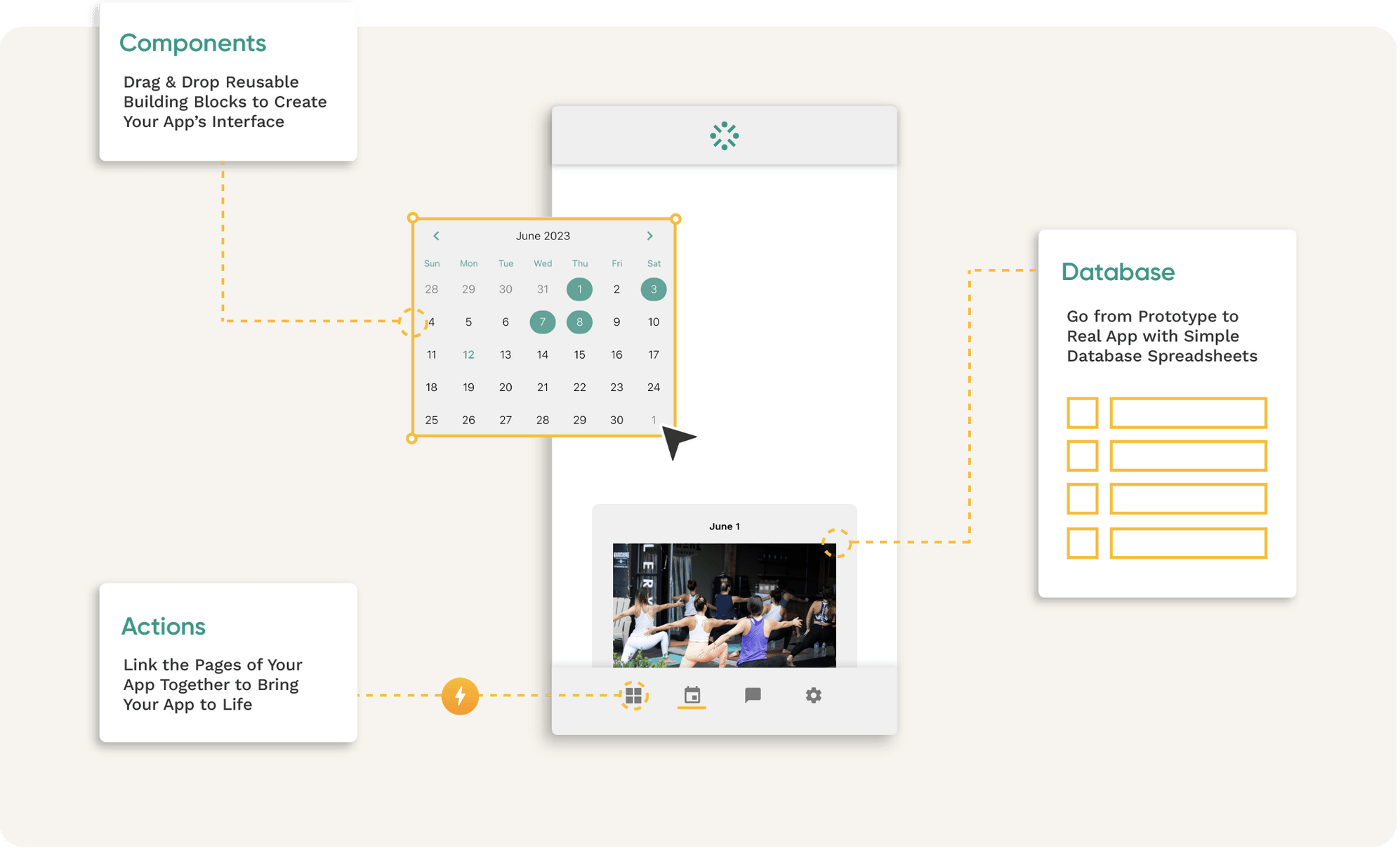
Adalo is designed to help people create, publish, and launch mobile native apps directly to the Apple and Google Play app stores. Designed for scale, it is a good platform if you are looking to create internal or customer-facing apps that will launch to the public quickly.
Its Magic Start AI, which generates database structures based on user prompts, is useful for creating internal tools like CRMs, financial management tools, and property management software.
Adalo also supports integration with AI programs like ChatGPT and Amazon ReKognition, allowing developers to incorporate features such as language translation and image recognition into their apps for users to enjoy.
Builder.ai
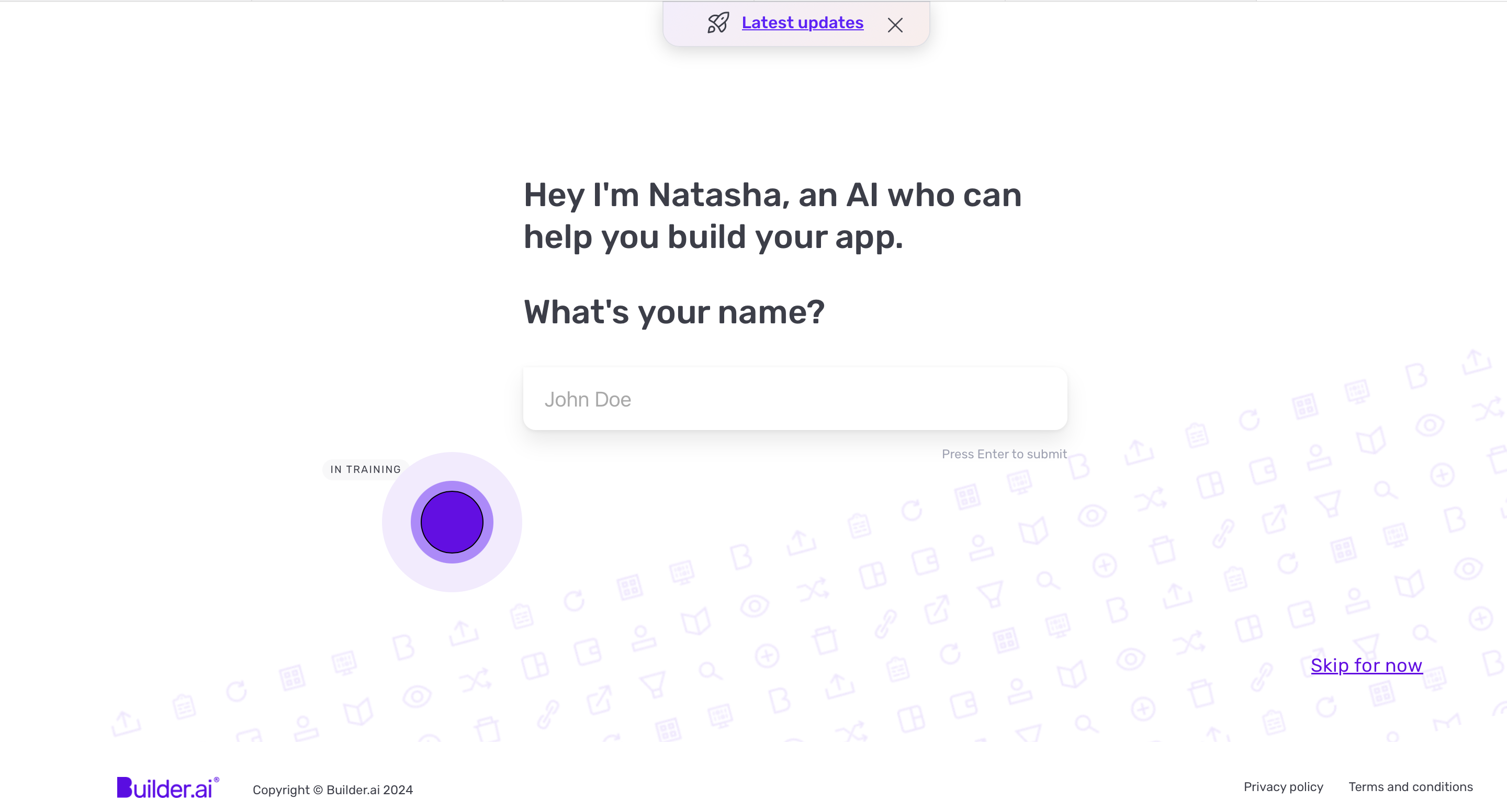
Builder.ai is a unique platform that combines the capabilities of no code platforms and development shops, with a primary focus on individual app developers. The platform's standout feature is its AI-powered product manager, Natasha, which offers a range of intelligent features to support the mobile app development process.
Natasha can provide feature recommendations and create prototypes based on your mobile app ideas, refine their concepts, and kickstart the development process.
Natasha will then also recommend suitable designers and developers to work on your project. Once the development is complete, Natasha checks the output for potential issues before the app undergoes final testing by human experts.
Compared to other platforms, Builder mainly uses AI in the actual development process–80% is automated–but the mobile apps themselves are fairly straightforward and simple.
Google AppSheet
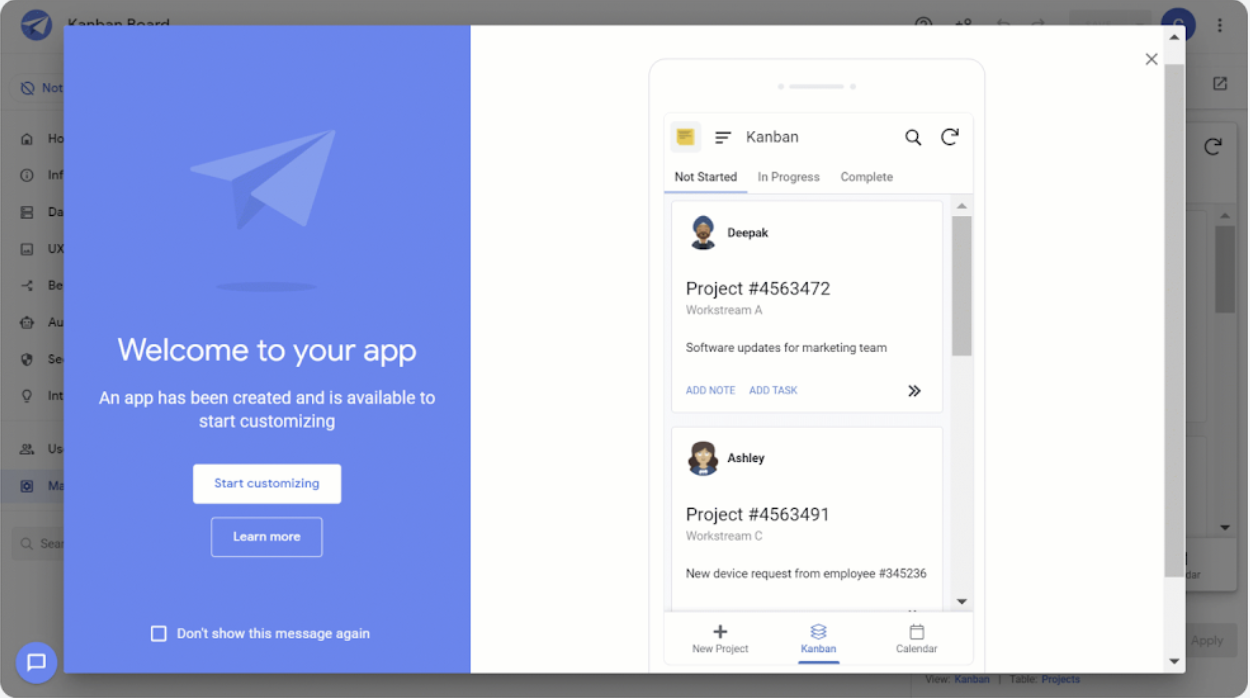
Google AppSheet is a no code platform that allows users to create custom mobile and web applications using data from sources like Google Sheets, Excel, or SQL databases. The platform's user-friendly interface makes it accessible to a wide range of app developers, even those without extensive coding knowledge.
One of AppSheet's key features is its AI collaborator, Gemini, which transforms user ideas into fully functional apps such as project trackers, team directories, or task managers. Users simply describe their desired app functionality, and Gemini generates software with features like data capture, document processing, and optical character recognition.
AppSheet integrates seamlessly with Google Workspace tools, including Gmail, Google Sheets, Apps Script, and Chat, allowing users to leverage their existing Google ecosystem. However, AppSheet has limited customization options compared to some other no code platforms. AppSheet is great if you’re working exclusively within the Google ecosystem, but if you want to integrate other tools or use data from more places, it isn’t the best option.
Voiceflow
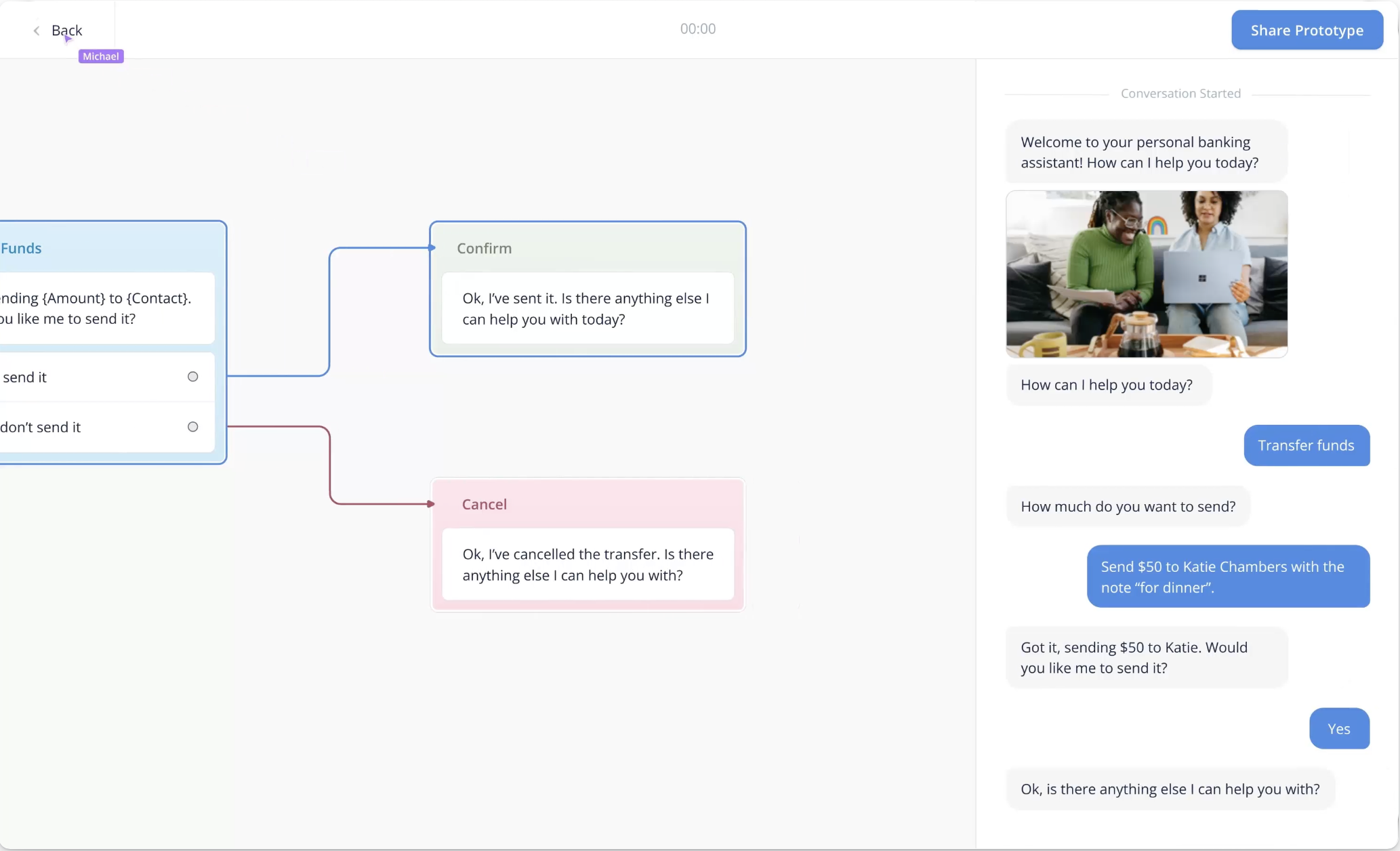
Voiceflow is great for businesses looking to integrate conversational AI into their web and mobile applications. With Voiceflow, companies can create sophisticated chatbots that can summarize complex information, understand user sentiment, and recommend features based on user behavior.
The platform's unique blend of a visual flowchart interface and developer-friendly features allows for customization and extension of conversational apps, adding bespoke features, integrations, and interfaces to suit specific needs.
Voiceflow's strength lies primarily in the field of conversational AI and is likely not an optimal choice for businesses looking to develop a broader range of business software unless you’re using it as an integration with another app builder.
FlutterFlow
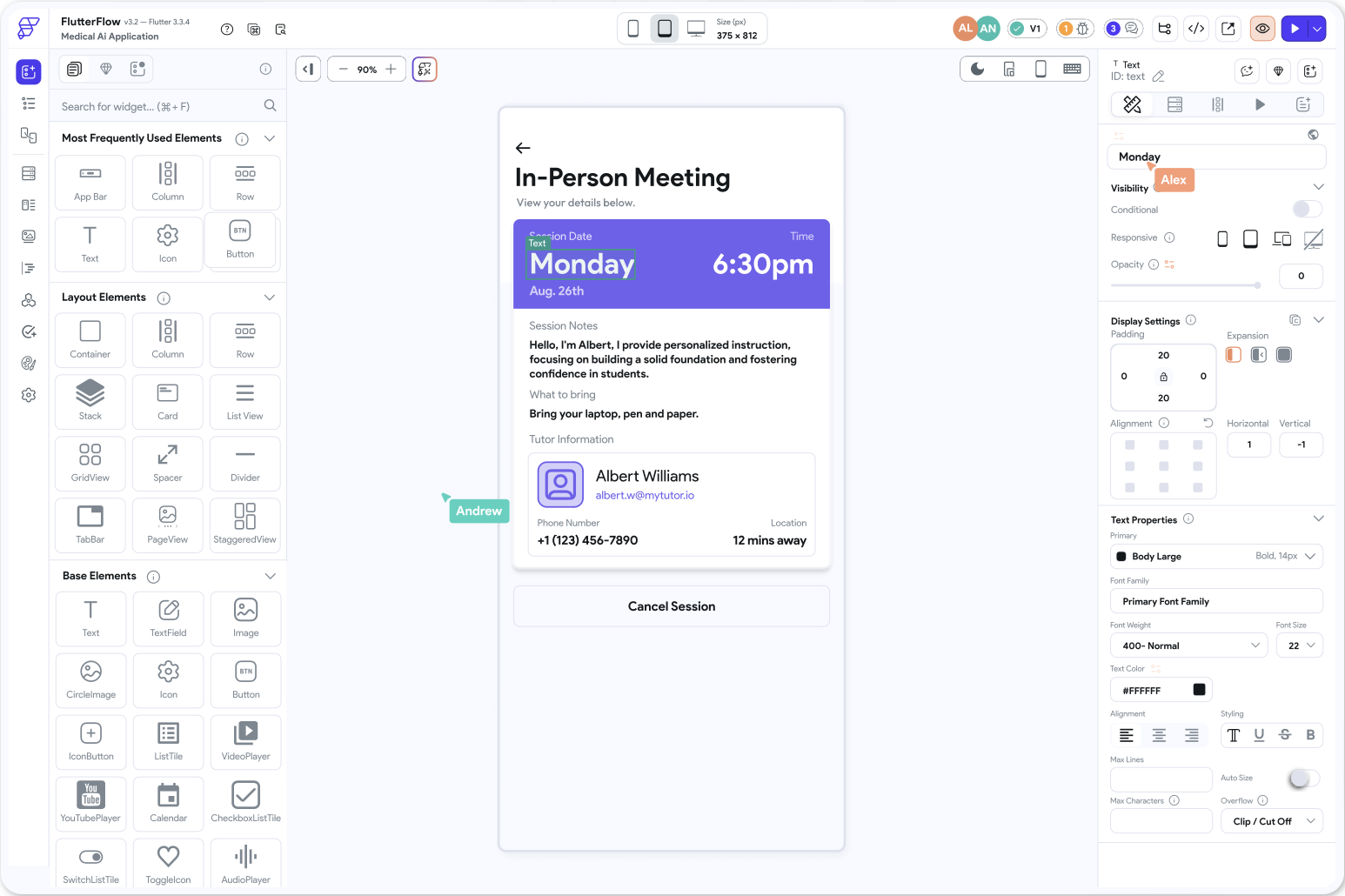
FlutterFlow is a developer-focused platform that streamlines native mobile app development for Android and iOS. With its drag-and-drop interface and extensive library of widgets and predesigned components, FlutterFlow allows users to create sophisticated business tools like chatbots, task managers, and group chat apps.
FlutterFlow also allows users to translate apps using Google Translate, develop collaboratively, and capture live screenshots for marketing materials. However, the platform has a steeper learning curve.
Scaling your business with the right AI app builder
Even without the traditional barriers of technical expertise or hefty budgets, no code AI app builders are paving the way for businesses of all sizes to build intelligent and powerful software.
As you continue to explore no code AI app builders, remember that the best custom app is the one that not only meets your current needs but also aligns with your long-term vision and business strategy.
The ideal platform should provide the flexibility to adapt as your business evolves and AI technology continues to advance. It should enable your team to quickly prototype ideas, iterate based on user feedback, and deploy solutions that make a tangible impact on your operations and customer experiences.
As you explore the possibilities of no code AI app development, remember that success is not only about building a powerful app, but rather about solving problems and creating value for your users or team. Start small, focus on delivering incremental improvements, and learn from each project. By continuously iterating and refining your approach, you'll unlock the full potential of AI-driven solutions.
Whether your goal is to streamline core internal workflows, enhance customer engagement, or simply bring your own app idea to life, platforms like Glide provide the tools and support you need to turn your vision into reality. Get started with Glide today.






